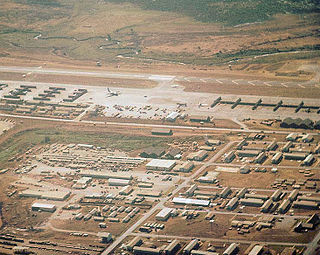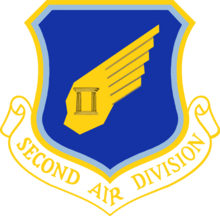
The 376th Air Expeditionary Wing is an inactive wing of the United States Air Force. It was last stationed at the Transit Center at Manas International Airport, Kyrgyz Republic, supporting U.S. and ISAF operations in Afghanistan.

Pleiku Air Base is a former air force base in Vietnam. It was established by the Republic of Vietnam Air Force (RVNAF) in 1962 at an undeveloped airstrip, and was used by the United States Air Force during the Vietnam War in the II Corps Tactical Zone of South Vietnam. It was captured by the People's Army of Vietnam (PAVN) in March 1975 and was abandoned for many years. Today, the facility has been redeveloped as Pleiku Airport。

Tan Son Nhut Air Base (1955–1975) was a Republic of Vietnam Air Force (RVNAF) facility. It was located near the city of Saigon in southern Vietnam. The United States used it as a major base during the Vietnam War (1959–1975), stationing Army, Air Force, Navy, and Marine units there. Following the Fall of Saigon, it was taken over as a Vietnam People's Air Force (VPAF) facility and remains in use today.

The South Vietnam Air Force, officially the Republic of Vietnam Air Force was the aerial branch of the Republic of Vietnam Military Forces, the official military of the Republic of Vietnam from 1955 to 1975.

The 3rd Air Division is an inactive United States Air Force organization. Its last assignment was with Strategic Air Command, assigned to Fifteenth Air Force, being stationed at Hickam AFB, Hawaii. It was inactivated on 1 April 1992.

The 405th Air Expeditionary Wing is a provisional United States Air Force unit assigned to Air Combat Command. It may be activated or inactivated at any time.

The 48th Airlift Squadron was part of the 314th Airlift Wing at Little Rock Air Force Base, Arkansas. It operates Lockheed Martin C-130J Super Hercules aircraft, conducting pilot and loadmaster training for airlift and airdrop operations.

The 62nd Airlift Squadron is part of the 314th Airlift Wing at Little Rock Air Force Base, Arkansas. Originally constituted in 1942 as the 62nd Troop Carrier Squadron, it first deployed to Morocco in 1943, remaining in Europe until its inactivation in 1946. It reactivated three years later and deployed to Japan during the Korean War. In 1967, the unit was redesignated the 62nd Tactical Airlift Squadron, and in 1991 the 62nd Airlift Squadron. It operates Lockheed C-130J Super Hercules aircraft and provides advanced training to pilots, copilots, and loadmasters for combat airlift and airdrop operations.

The 97th Airlift Squadron is a United States Air Force Reserve squadron, assigned to the 446th Operations Group, stationed at Joint Base Lewis-McChord, Washington. It is a USAF Associate Unit of the active duty 4th Airlift Squadron, 62d Airlift Wing.

The 95th Airlift Squadron is an inactive United States Air Force unit. It was last active at Pope Army Airfield, North Carolina, where it was assigned to the 440th Operations Group and operated Lockheed C-130 Hercules aircraft supporting the global reach mission worldwide.

The 416th Fighter Squadron is an inactive United States Air Force unit. Its last assignment was with the 49th Fighter Wing at Holloman Air Force Base, New Mexico. The squadron was inactivated on 1 July 1993.

The 313th Expeditionary Operations Group is a Provisional United States Air Force unit, assigned to United States Air Forces in Europe to activate or inactivate as needed. It was last active at Moron Air Base, Spain, supporting Operations Odyssey Dawn and Unified Protector to enforce a no-fly zone over Libya. It was inactivated on 31 October 2011.

The 315th Operations Group is a United States Air Force Reserve unit assigned to the 315th Airlift Wing. The unit is stationed at Charleston Air Force Base, South Carolina. The 315th Group controls all operational McDonnell Douglas C-17 Globemaster III flying squadrons of the 315th Airlift Wing. It was activated in 1992, when Air Force Reserve Command implemented the Objective Wing organization.

The 439th Operations Group is an active United States Air Force Reserve unit. It is the flying component of the Twenty-Second Air Force 439th Airlift Wing, stationed at Westover Air Reserve Base, Massachusetts.

The 19th Weapons Squadron is a United States Air Force unit assigned to the USAF Weapons School at Nellis AFB, Nevada.

The 29th Weapons Squadron is a United States Air Force unit, stationed at Little Rock Air Force Base, Arkansas. It is assigned to the USAF Weapons School at Nellis Air Force Base. The mission of the squadron is to provide advanced Lockheed C-130J Hercules instructional flying.

The 776th Expeditionary Airlift Squadron is a provisional United States Air Force squadron activated after 11 September 2001, being engaged in the Global War on Terrorism. Its current status is not publicly known.

The 777th Expeditionary Airlift Squadron is a provisional United States Air Force squadron, which served for various periods between August 1943 and May 2011.

The 772nd Expeditionary Airlift Squadron is a provisional United States Air Force unit, assigned to Air Combat Command to activate or inactivate as needed. It is deployed with the 451st Air Expeditionary Wing at Kandahar Airfield, Afghanistan.

The 774th Expeditionary Airlift Squadron is a provisional United States Air Force unit, assigned to the 455th Expeditionary Operations Group at Bagram Air Base, Afghanistan. The squadron provides airlift to forces engaged in the War in Afghanistan.






















